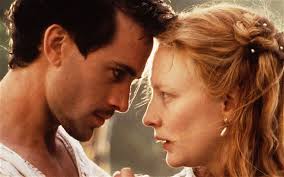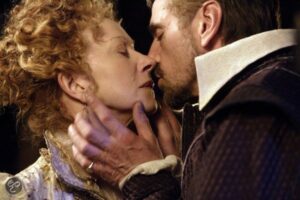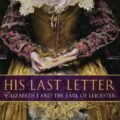
After reading Jeane Westin’s wonderful novel about the relationship between Elizabeth I and Robert Dudley, the Earl of Leicester, I asked Jeane her opinion on two questions:-
- Why didn’t Elizabeth and Leicester marry?
- Was what they felt true love?
Jeane has kindly written a guest article for The Elizabeth Files answering these questions – thank you, Jeane!
You can read my review of Jeane’s novel, “His Last Letter: Elizabeth I and the Earl of Leicester”, at http://reviews.theanneboleynfiles.com/his-last-letter-by-jeane-westin/420 and bid for a signed copy over at The Anne Boleyn Files – Signed Book Up for Grabs.
Elizabeth and Leicester
by Jeane Westin
Thank you Claire for this opportunity to write more about Elizabeth and the Earl of Leicester. You had two questions for me: Why didn’t Elizabeth and Robin marry? Was what they felt true love?
Why Didn’t Elizabeth and Robin Marry?
There are multiple reasons Elizabeth avoided marriage, although I think, at times, she wavered. The principle reason was her power: she did not want to share it. Also, marriage in Tudor times gave the husband control over his wife (due to the Tudor belief in God’s chain of being, with women near the bottom of the chain) and Robert certainly wanted to be a king, although not enough to marry Mary Stuart, Queen of Scots. Elizabeth’s efforts to send him north to Mary, though half-hearted, played a big part in His Last Letter. The idea, which seemed like a solution to the Stuart’s Queen’s French intentions was one Elizabeth couldn’t allow. A French king (and potential army) on her northern border was anathema to her and she wished to avoid it even at the cost of losing her Robin. Whether she would really have sent Dudley to Mary is a question that I had an interesting time with in the book. Mary Stuart was the second-best catch in Europe at that time and was highly resentful of Elizabeth’s offer of “her paramour,” though she eventually relented and agreed that Robert could come north to visit her. Robert fought Elizabeth on this matter until they both came to tears.
Why would Robin fight so against becoming Mary’s husband? There can be only one answer. He wanted Elizabeth and had every reason to believe she wanted him. Now what would give him that idea?
In addition to her fear of power-sharing, Elizabeth had youthful experiences that did not dispose her to marry. Her father’s cruel treatment of his wives, especially Anne Boleyn and Catherine Howard, probably helped to set her mind against marriage. Sir Thomas Seymour and his pursuit of Elizabeth while married to Katherine Parr, did not improve matters, whatever happened between him and the fourteen year old Princess Elizabeth. There were also rumors of her inability to have successful congress (as they called it) with a man, but I doubt they were true or the court doctors who examined her several times would not have been able to keep the secret, at least not forever.

Religion also swayed her decision-making. If she married a Catholic, she alienated her Protestant people. If she married a Protestant, Catholic Englishmen might rebel as the north did early in her reign. Elizabeth trod a narrow path between the two forms of Christianity throughout her reign, not always successfully.
It was in her interest not to marry so that she could keep dangling the English throne in front of France and Spain, thus protecting England from invasion until the last possible moment by which time her fleet was ready.
True Love?
Were Elizabeth and the Earl of Leicester truly in love? They were seldom parted for decades during her long rule and then only with mutual heartache. Her letters to him in Holland, written with anger, hold all the evidence of love betrayed. And her tender letters of reconciliation, signed, always the same, certainly speak to a deep attachment. We don’t have their youthful letters. They had ears to whisper into.
Robert Dudley withstood her angry tirades and reveled in her loving attention…it is reported, she tickled his neck as he knelt to become a Garter Knight at Westminster. He wrote to her as he lay dying. When there are so many signs of deep affection, denying it makes no sense to me. Finally, I had to explore their relationship and wrote His Last Letter to tie the strands of their history together.
Jeane Westin
The Virgin’s Daughters:In the court of Elizabeth I, August 2009
His Last Letter:Elizabeth I and the Earl of Leicester, August 2010






I think Mary’s unpopular marriage must have also played in her mind. It was politically necessary to dangle herself as bait, but actually following through would have been unpopular with her people and must have felt like giving her country away to her foreign husband. But marrying an Englishman might have led to revolts or even civil war between the political factions, so that was no good, either.
She’d also feared imminent death in the tower, and that, plus watching her father’s matrimonial history, must have impressed in her mind how quickly it could all come tumbling down. Jane Seymour and Katherine Parr, even in ‘happy’ marriages, dying of childbed fever wouldn’t have eased her fears about marriage and childbirth, either.
I don’t blame her for feeling that her future was only safe as long as it was in HER hands, despite the emotional price she paid for that decision. She probably felt it was the price one paid for being a monarch, perhaps even that it was a test from God or simply her duty to put her country ahead of her own personal desires.
She was definitely a woman ahead of her times, as her mother had been. I admire both of these remarkable women!
I agree that there was great love between them, passionate at first but then tempering to a sort of old-married-couple relationship. He was always so protective of her and she, in many ways, treated him cruelly. Her tirades, her jealousy (keeping him at her court away from his wife) and her temper would have tested any man’s patience, yet he remained hers until the end. I think only deep love can have that effect. Can’t wait to read the book!!
Hi Impish,
I agree with you, Elizabeth was damned if she did and damned if she didn’t, as we say in England. She was being urged to marry but it would have caused huge problems if she did. She made a sensible choice, both for her country and for her own good.
Hi Anne,
As I walked around Kenilworth looking at the ruins of the apartments he built for her, looking at the gatehouse and gardens, I realised just how much Dudley had loved Elizabeth. He always put her first and coped with her rages, that is an incredibly deep love.
A friend has kindly sent off for this book for me. I cannot wait to read it. I am convinced that Robert Dudley was Elizabeth’s true love.
Claire, I am hoping to visit Kenilworth soon. I understnad that the gardens have been laid out to look like they did in 1575 when Elizabeth visited there on the most famous progress of her reign. It has been said that when Elizabeth pointed out that she could not
see the formal gardens from her window that Leicester ordered a similar garden to be laid out overnight engaging an army of worker for the purpose. When Elizabeth looked out of her window in the morning to her delight there was new garden.
I agree, Carol, I think he was her true love and I was even more convinced of that when I visited Kenilworth and found out what he did in anticipation of her visit. You can see my photos of the castle and the Elizabethan garden at http://www.flickr.com/photos/theanneboleynfiles/sets/72157624536258800/.
Thank you very much Claire for letting me see the lovely photographs that you have of Kenilworth – it has certainly wetted my appetite for a visit.
It is a wonderful place to visit and it’s not far from Warwick Castle so you could do both.
I don’t think many historians had written (unless they were partial to Elizabeth) that Queen Mary of Scots was second in demand. Elizabeth was a ruler first while Mary was a woman first. I have no doubts that Elizabeth didn’t marry because of her father. Her life was full of instability because of the women who followed her mother. Even if they were kind at one point, most were ambitious and wanted their own children to rule. Elizabeth didn’t fare well with her siblings ruling (neither did Quuen Mary – her 1/2 sister) and knew kings could do away eaily with queens. Why wouldn’t she want to avoid allowing someone else to rule. Even though many would bash her 1/2 sister Mary, she also was threatened by the possibility of her siblings ruling due to opposing religions. You can’t believe everything you read but it only make sense that they were all in competition and much of it due to their father’s I’ll deeds.
I don’t think many historians had written (unless they were partial to Elizabeth) that Queen Mary of Scots was second in demand. Elizabeth was a ruler first while Mary was a woman first. I have no doubts that Elizabeth didn’t marry because of her father. Her life was full of instability because of the women who followed her mother. Even if they were kind at one point, most were ambitious and wanted their own children to rule. Elizabeth didn’t fare well with her siblings ruling (neither did Quuen Mary – her 1/2 sister) and knew kings could do away eaily with queens. Why wouldn’t she want to avoid allowing someone else to rule. Even though many would bash her 1/2 sister Mary, she also was threatened by the possibility of her siblings ruling due to opposing religions. You can’t believe everything you read but it only make sense that they were all in competition and much of it due to their father’s ill deeds.